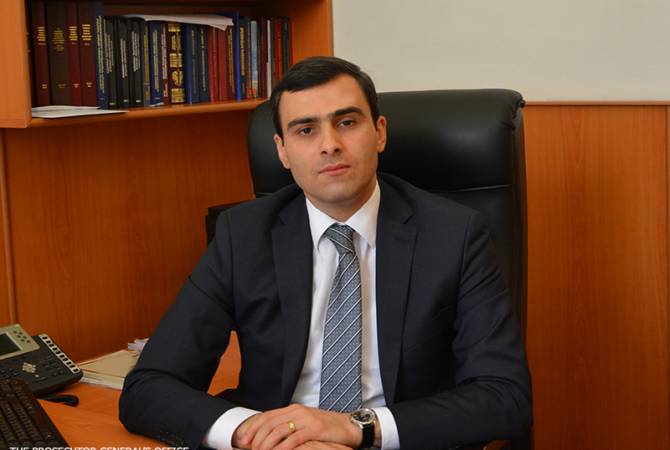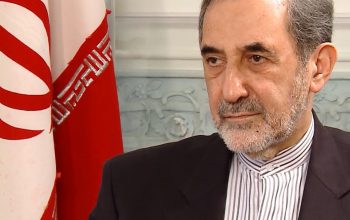Gevorg Baghdasaryan, a senior Armenian law-enforcement official who led controversial investigations into high-ranking clergy, billionaire Samvel Karapetyan, and other critics of Prime Minister Nikol Pashinyan, abruptly resigned on Wednesday.
Baghdasaryan headed a powerful division within the Investigative Committee responsible for probing crimes “against the state, the constitutional order, and public security.” The agency offered no explanation for his resignation, and Baghdasaryan himself has made no public comment.
His departure comes amid mounting backlash against the Pashinyan government’s aggressive campaign targeting the leadership of the Armenian Apostolic Church and influential political opponents. The division Baghdasaryan led launched three politically charged criminal cases in June, coinciding with the prime minister’s escalating rhetoric against top clergy.
On June 17, billionaire businessman Samvel Karapetyan was arrested and charged with inciting violent regime change—just hours after he publicly denounced Pashinyan’s crackdown on the Church.
Days later, Archbishop Bagrat Galstanyan—an outspoken cleric and protest leader—was arrested along with 14 others on charges of planning “terrorist acts” to seize power. A second prominent cleric, Archbishop Mikael Ajapahyan, was also detained and accused of promoting the “seizure of power” through his public statements.
All three men deny the charges, calling them politically motivated. So do a broad range of Armenian opposition leaders, who have accused the Investigative Committee of acting as an instrument of political repression under Pashinyan’s direction.
The Committee announced last week that its investigations into Galstanyan and Ajapahyan had concluded, and that both cases would soon be referred to Armenia’s courts. The charges, however, have only deepened public concern over the government’s use of state power to silence dissent.
The crackdown has even raised fears that Catholicos Garegin II, the supreme head of the Armenian Apostolic Church, could be targeted next. On July 7, Pashinyan hinted at possible law enforcement action against the Church’s headquarters in Echmiadzin—a raid that, while rumored, has yet to materialize.
Before taking charge of this politically sensitive division, Baghdasaryan served as Armenia’s deputy prosecutor-general. He also played a prominent role in the lengthy trial of former President Robert Kocharyan, which collapsed without a verdict in late 2023.
Baghdasaryan’s sudden exit has fueled speculation that internal dissent may be brewing within Armenia’s law enforcement elite, especially as public pressure mounts over the government’s authoritarian turn.
Gevorg Baghdasaryan, a senior Armenian law-enforcement official who led controversial investigations into high-ranking clergy, billionaire Samvel Karapetyan, and other critics of Prime Minister Nikol Pashinyan, abruptly resigned on Wednesday.
Baghdasaryan headed a powerful division within the Investigative Committee responsible for probing crimes “against the state, the constitutional order, and public security.” The agency offered no explanation for his resignation, and Baghdasaryan himself has made no public comment.
His departure comes amid mounting backlash against the Pashinyan government’s aggressive campaign targeting the leadership of the Armenian Apostolic Church and influential political opponents. The division Baghdasaryan led launched three politically charged criminal cases in June, coinciding with the prime minister’s escalating rhetoric against top clergy.
On June 17, billionaire businessman Samvel Karapetyan was arrested and charged with inciting violent regime change—just hours after he publicly denounced Pashinyan’s crackdown on the Church.
Days later, Archbishop Bagrat Galstanyan—an outspoken cleric and protest leader—was arrested along with 14 others on charges of planning “terrorist acts” to seize power. A second prominent cleric, Archbishop Mikael Ajapahyan, was also detained and accused of promoting the “seizure of power” through his public statements.
All three men deny the charges, calling them politically motivated. So do a broad range of Armenian opposition leaders, who have accused the Investigative Committee of acting as an instrument of political repression under Pashinyan’s direction.
The Committee announced last week that its investigations into Galstanyan and Ajapahyan had concluded, and that both cases would soon be referred to Armenia’s courts. The charges, however, have only deepened public concern over the government’s use of state power to silence dissent.
The crackdown has even raised fears that Catholicos Garegin II, the supreme head of the Armenian Apostolic Church, could be targeted next. On July 7, Pashinyan hinted at possible law enforcement action against the Church’s headquarters in Echmiadzin—a raid that, while rumored, has yet to materialize.
Before taking charge of this politically sensitive division, Baghdasaryan served as Armenia’s deputy prosecutor-general. He also played a prominent role in the lengthy trial of former President Robert Kocharyan, which collapsed without a verdict in late 2023.
Baghdasaryan’s sudden exit has fueled speculation that internal dissent may be brewing within Armenia’s law enforcement elite, especially as public pressure mounts over the government’s authoritarian turn.




